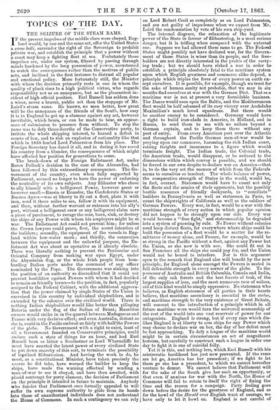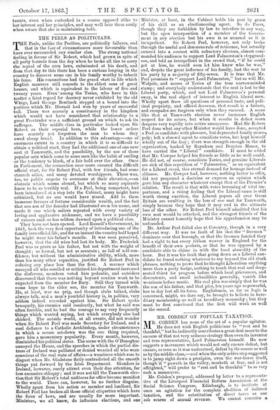TOPICS OF THE DAY.
THE SEIZURE OF THE STEAM RAMS.
IF the present impulses of the middle class were obeyed, Eng- land would, by one and the same act, offer the United States a cams belli, surrender the right of the Sovereign to prohibit private war, and establish the principle that a power without a coast may keep a fighting fleet at sea. Fortunately those impulses arc, under our system, filtered by passing through minds hardened by the long possession of power, accustomed to watch the consequences rather than the motives of public acts, and inclined in the first instance to distrust all popular and emotional policy. More fortunately still, the Minister with whom the decision primarily rests is one in whom the quality of pluck rises to a high political virtue, who regards responsibility not as an annoyance, but as the pleasantest in- cident of high official position. Earl Russell has seldom done a wiser, never a braver, public act than the stoppage of Mr. Laird's steam rams. lie knows, no man better, how great will be the annoyance of the friends of the South, how easy it is in England to get up a clamour against any act, however inevitable, which bears, or can be made to bear, an appear- ance of submission to pressure from without. To stop the rams was to defy three-fourths of the Conservative party, to irritate the whole shipping interest, to hazard a defeat in courts of law, and to risk an explosion of nationality like that which in 1858 hurled Lord Palmerston from his place. The Foreign Secretary has dared it all, and in daring it has saved his country from a blunder, the consequences of which might have affected her position for generations to come. The break-down of the Foreign Enlistment Act, under Baron Pollock's decision in the case of the Alexandra, had been followed by this extraordinary consequence. The Go- vernment of the country, even when fully supported by Parliament, seemed no longer to have the power of enforcing the neutrality of its own subjects. Any filibuster who chose to ally himself with a belligerent Power, however great or however small—Russia or Ecuador, the Confederate States or Buenos Ayres—was at liberty to fit out a fleet, plate it with iron, send it three miles to sea, follow it with its equipment, and then, without further warrant or entrance into his ally's port, without a belligerent crew or any belligerent claim save a piece of parchment, to ravage the seas, burn, sink, or destroy the ships of any Power with whom his employers might be at war. The Enlistment Act could not prevent him; for unless the Crown lawyers could prove, first, the secret intention of the builders ; secondly, the equipment of the vessels in Eng- land within low-water mark; and thirdly, the connection between the equipment and the unlawful purpose, the En- listment Act was about as operative as if already obsolete. There was literally nothing to prevent the Peninsular and Oriental Company from making war upon Egypt, under the Abyssinian flag, or the whole Irish people from bom- barding Italian ports under the command of any officer nominated by the Pope. The Government was sinking into the position of an authority so discredited that it could not prevent hostilities against Powers with whom it had decided to remain on friendly terms—to the position, in fact, popularly assigned to the Federal Cabinet, with the additional aggrava- tion that the power claimed by single States of the Union is exercised in this country by individual shipbuilders, and is extended by the colonies over the civilized world. There is nothing Indian shipbuilders would like better than pillaging Batavia under the flag of the Sultan of Bruni; Mauritius owners would strike in in the quarrel between Madagascar and France with very decisive effect; and even Australia, distant as she is, could in the Pacific embroil us fairly with half the Powers of the globe. No Government with a right to exist, least of all a Government founded on Conservative principles, could endure such a state of things for an hour, and had Earl Russell been as bitter a Southerner as Lord Wharncliffe he must have asserted the latent power of every civilized State to put down anarchy of this sort, to terminate the possibility of legalized filibusterism. And having the work to do, he must, as a constitutional Minister, have taken precisely the course he did take, have warned the builder to keep the ships, have made the warning effectual by sending a man-of-war to see it obeyed, and have then awaited, with placid contempt for party clamour, the decision of Parliament on the principle it intended in future to maintain. Anybody who fancies that Parliament once formally appealed to will suffer its own supreme authority to glide from its hands into those of unauthorized individuals does not .understand the House of Commons. In such a contingency we can rely on Lord Robert Cecil as completely as on Lord Palmerston, and are not guilty of impudence when we expect from Mr. • Laird the condemnation by vote of his own ship-yard. The internal disgrace, the relaxation of the legitimate power of the State in favour of filibustering, is a most serious danger, but it is trifling when compared with the external one. Suppose we had allowed these rams to go. The Fedeaal States might possibly not have declared war, for the Govern- ment of those States is wiser than its people, and the free- holders are not directly interested in the profits of the carry- ing trade ; but we should have risked a war in order to establish a principle absolutely fatal to the maritime system upon which English greatness and commerce alike depend, a principle which triples the force of every power on earth ex- cept ourselves. It is possible, for example, though we trust for the sake of human sanity not probable, that we may in six months find ourselves at war with the German Diet. That as a maritime war is not at present a very formidable business. The Danes would soon open the Baltic, and the Mediterranean fleet would be half ashamed of its easy victory over Archduke Maximilian's much loved squadrons. But there would, be another enemy to be considered. Germany would have- a right to build iron-clads in America, in Holland, and in Russia, to send them to sea with no sailors beyond a. German captain, and to keep them there without any port of entry. From every American port over the Atlantic and throughout the Pacific German men-of-war would be- preying upon our commerce, harassing the rich Indian coast, raising freights and insurances to a figure which would terminate freight. The Indian trade, the Colonial trade, the American trade, would disappear, or be reduced to the dimensions within which convoy is possible, and we should. be forced in our own despite to declare war on America—that is, to do the very act the menace of which from the Federals seems to ourselves so insolent. The whole balance of power,. the comparative strength of States in the world, would be,. in fact, overact. Statesmen would have to count not only the fleets and the armies of their opponents, but the possibly hostile resources of friendly dockyards, to " conciliate builders in Pennsylvania as well as statesmen in Paris, to. count the shipwrights of California as well as the soldiers of German Powers. Every war, in fact, would be a war with the maritime strength of every nation in which popular opinion did not happen to be strongly upon our side. Every war would become a " free fight," and statesmanship be degraded into a system of guessing by rule. No Power without colonies need keep distant fleets, for everywhere where ships could be built the possession of a fleet would be a matter for the re- mittance of money alone, and France, for example, would be as strong in the Pacific without a fleet, against any Power but the Union, as she now is with one. She could fit out in San Francisco all the ships she could pay for, and the Union would not be bound to interfere. Nor is this argument open to the remark that England also will benefit by the new principle, for England alone amongst the Powers is seated in full defensible strength in every corner of the globe. To the possessor of Australia and British Columbia, Canada and India, of the only oak forests and the best forests of teak, of the largest supplies of iron, and the most numerous race of sailors, aid of this kind would be simply oppressive. No statesman who believes, as English statesmen of all parties in their hearts believe, that maritime ascendancy is essential to the status, and maritime strength to the very existence of Great Britain, will consent to the introduction of a principle which in all future maritime wars would turn the universal seamanship of the rest of the world into one vast reservoir of power for our antagonists. England is strong, but if every race which dis- likes England is at liberty to arm ships for any Power which may choose to declare war on her, the day of her defeat must be fast approaching. To defy a league of the maritime world might be in certain circumstances an act of magnificent heroism, but carefully to construct such a league in order one day to fight it is one of suicidal folly. Yet it is this, and nothing less, which Earl Russell with his aristocratic hardihood has just now prevented. If the rams are let go, America has her precedent; if we fight to let them go she has a precedent, to which we cannot hereafter venture to demur. We cannot believe that Parliament will for the sake of the South give her such an opportunity, or that even if anxious for war with the North, the House of Commons will fail to retain to itself the right of fixing the time and the reason for a campaign. Party feeling goes down before the desire for the greatness of England, and as for the howl of the Herald over English want of courage, we have only to let it howl on. England is not careful of taunts, even when embarked in a course opposed alike to her interest and her principles, and may well bear them easily when aware that she is maintaining both.































 Previous page
Previous page